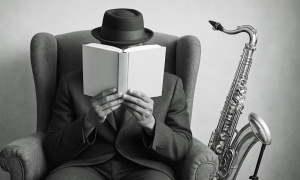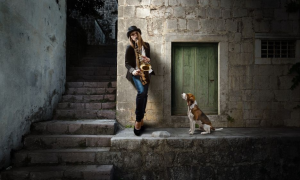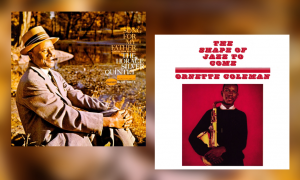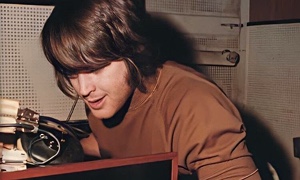Home » Jazz Articles » Building a Jazz Library » Charlie Parker: Remastered Highlights From His Peak Years
Charlie Parker: Remastered Highlights From His Peak Years

I went over and took his pulse. It was still there. Then it stopped. At the moment of his going, there was a tremendous clap of thunder. I didn't think about it at the time, but I've thought about it often since; how strange it was.
—Baroness Pannonica Rothschild de Koenigswarter
If he had survived his several excesses and addictions, it is possible Parker would still be with us this coming 29th August 2021, his 101st birthday. As the pianist Eubie Blake, who lived to be 96, said on one of his later birthdays: "If I'd known I was going to live this long, I'd have taken better care of myself." Or as Parker is reported to have said to the doctor examining him on his deathbed in the hotel suite of the Baroness Pannonica Rothschild de Koenigswarter, when asked by the Baroness' physician whether he drank: "Sometimes I take a sherry before dinner." Parker was 34 years old.
Given his choice of words, together with the company and the surroundings, it is likely Parker delivered this bon mot with the straightfaced upper-class English accent he occasionally affected. The Baroness herself, though she spent most of her days (which began mid afternoon and ended around dawn) in the company of African American jazz musicians, retained her impeccable cut-glass aristocratic British accent throughout her life, although her lexicon was enriched by her lifestyle. Once, waiting at a stop light in her newly acquired souped-up Bentley S1 Continental Drophead Coupe, about to hot-rod Miles Davis in his Mercedes-Benz down Manhattan's Seventh Avenue in the small hours, the Baroness turned to Hampton Hawes in the passenger seat beside her and said "in her prim British tone: 'This time I believe I'm going to beat the motherfucker.'" Hawes, writing in his autobiography, Raise Up Off Me (Coward, McCann & Geoghegan, 1974), does not record who won the race.
Incidentally, the doctor to whom Parker in 1955 confided his preprandial indulgence, Dr. Robert Freymann, was no innocent when it came to a little of what you fancy. A decade later, he was said to be the inspiration for the song "Doctor Robert" on the Beatles' album Revolver (EMI, 1966). Among the good doctor's specialities, dispensed on a cash basis to walk-up clients at his East 78th Street consulting room, was a "vitamin injection" in which the principal active ingredient was a hefty whack of amphetamine. Freymann's mostly well-to-do Upper East Side patients included the Baroness and Jackie Kennedy, along with a big band's worth of jazz musicians, some of whom called him The Great White Father after his scalpful of white hair. In 1974, Freymann was expelled from the New York Medical Society for malpractice. His memoir, What's So Bad About Feeling Good? (Jove Publications), was published in 1983.
But back to the business at hand....
 Celebrating Bird At 100: Remastered Selections From The Dial Recordings
Celebrating Bird At 100: Remastered Selections From The Dial Recordingsezz-thetics, 2020
Covering the years 1946 and 1947, volume one of the Celebrating Bird At 100 albums cherry picks 24 of the 87 or so more or less complete takes Parker recorded for Ross Russell's Dial label, first in Los Angeles, then in New York following an enforced spell in California's Camarillo State Hospital, where he was treated, with temporary success, for his addictions. Four of the tracks were recorded pre-Camarillo on 28 March 1946 (with good taste, ezz-thetics does not include any material from the disastrous but fetishized "Lover Man" session of 29 July 1946, shortly before Parker's incarceration). The March session produced Parker's historic, giddying "famous alto break" on the first take of Dizzy Gillespie and Frank Paparelli's "A Night In Tunisia," a take which had to be scrapped because the ensemble sections were so ragged (the break itself was preserved and first released on a for-collectors LP by Dial).
Ross Russell explained to Robert Reisner how the "famous alto break" came about during an interview for Reisner's Bird: The Legend Of Charlie Parker (Da Capo, 1974). "Parker was a musician who solved problems so quickly that logic often seemed dispensed with and sheer intuition called forth," said Russell. "His insight, concept and execution were far above the already high professional level of jazz recording stars. He played his finest solo on the initial take, well before the other musicians had worked out their own concepts, let alone digested the ensemble parts.... Parker often blew his finest on early takes." The next three tracks were recorded in Los Angeles after Parker's release from Camarillo, and include Parker's lovely, easy swinging "Relaxin' At Camarillo." The remaining 17 tracks were recorded in 1947 in New York, where a bigger pool of cutting-edge sidepersons were available to Parker than in Los Angeles, which was a couple of years behind the East Coast bopwise, and when Parker himself was in peak form. Heavenly stuff. See below for Tracks and Personnel. Total Playing Time: 72:10.
 Celebrating Bird At 100: Remastered Selections From The Savoy Recordings
Celebrating Bird At 100: Remastered Selections From The Savoy Recordingsezz-thetics, 2020
Heaven continues to be on the ascendant on volume two, all of it recorded in New York for Herman Lubinsky's Savoy label, presenting 23 tracks cherry picked from another rich seam of magic. The opening four tracks are from 26 November 1945, the first occasion on which Parker (with his "Reeboppers") recorded under under his own name. The other 19 tracks were made in 1947 and 1948, the years which are generally agreed to have been Parker's most consistently outstanding, when post-Camarillo he enjoyed a second burst of creative exuberance, mostly dope fuelled but not yet dope handicapped.
The closing five tracks are from a concert headlined by Dizzy Gillespie's big band at Carnegie Hall on 29 September 1947, at which Parker was a member of the breakout quintet heard here. This was Gillespie's first appearance at Carnegie Hall and he recalled it in some detail in his autobiography To Be, Or Not...To Bop (Doubleday, 1979). "At that concert, Charlie Parker did something," wrote Gillespie. "People try to create some dissension between Charlie Parker and me. They don't know how warm a relationship we had. On the stage, after one of the [big band] numbers, Charlie Parker just walked out on the stage with one rose, one long rose—he'd probably spent his last quarter to buy it—and gave it to me. And he kissed me—on the mouth—and then walked off. I get a warm feeling every time I think about Charlie Parker." The two men play beautifully together. Parker's pre-solo cadenza on "A Night In Tunisia" is as close as close can get to the hoodoo of the "famous alto break" recorded for Dial in Los Angeles on 28 March 1946 and the equally extraordinary one, with Gillespie at his side, on Jazz At Massey Hall (Debut, 1953). Total Playing Time: 72:07.
 Bebop Live
Bebop Liveezz-thetics, 2020
A 2 x CD set, Bebop Live comprises 30 performances recorded beween June 1945 and December 1949, most of them at New York's Royal Roost. Unlike some musicians, who might stiffen up when playing live, Parker thrived on stage in front of an audience, stimulated to take risks like they were going out of style. The vibe at the Royal Roost encouraged this tendency in Parker. In his biography Bird Lives! The High Life And Hard Times Of Charlie 'Yardbird' Parker (Charterhouse, 1973), Ross Russell wrote: "[It was] a new kind of jazz club. Among its innovations were...a milk bar for those too young to drink alcoholic beverages, and a bullpen or bleachers, where customers could sit and listen as long as they liked without having to pay a cover charge. The Royal Roost was large, comfortable, and attractively lighted. Artists had decent dressing rooms. A long bar running the length of one side encouraged fraternization of musicians and fans. The venture was an immediate success."
Bebop Live includes four versions of Parker's "Scrapple From The Apple" and five of Dizzy Gillespie and Kenny Clarke's "Salt Peanuts." The iterations are illuminating: it is often said that no two Parker solos were alike, even on the most well-travelled material, and, signature licks aside, this is the proof. Here is some of the most abandoned blues-based jazz lyricism ever caught on tape, sounding as thrilling in 2021 as it must have done to audiences all those years ago, and benefitting hugely from ezz-thetics' remastering. Total Playing Time: 139:11.
Postscript: Every jazz fan on the planet has surely heard of Charlie Parker, but each new generation of listeners seems to actually listen to him less frequently than the generation before it. This likely has less to do with the music in the grooves—which retains its edge and urgency and body rocking visceralism—than with audio quality. Parker's recordings were made, by 2021 standards, on primitive equipment. Artists who peaked after the advent of technical advances such as stereo and multi-channel studio consoles, from around 1960 onwards, fare better with modern newbies. Which is why ezz-thetics' remastering project is valuable, helping to ensure Parker's legacy sounds better as it ages. To exit where we started, these pressings will delight Parker connoisseurs and provide the perfect entry point for newbies.
Tracks and Personnel
Remastered Selections From The Dial RecordingsTracks: Moose The Mooche; Yardbird Suite; Ornithology; A Night In Tunisia; Bird's Nest; Cool Blues; Relaxin' At Camarillo; Dexterity; Bongo Bop; Dewey Square; The Hymn; Bird Of Paradise; Embraceable You; Bird Feathers; Klact-oveeseds-tene; Scrapple From The Apple; My Old Flame; Out Of Nowhere; Don't Blame Me; Drifting On A Reed; Quasimodo; Charlie's Wig; Bongo Beep; Crazeology.
Collective Personnel: Charlie Parker: alto saxophone; Miles Davis: trumpet; Howard McGhee: trumpet; J.J. Johnson: trombone; Lucky Thompson: tenor saxophone; Wardell Gray: tenor saxophone; Dodo Marmarosa: piano; Erroll Garner: piano; Duke Jordan: piano; Barney Kessel: guitar; Arvin Garrison: guitar; Red Callender: bass; Tommy Potter: bass; Vic Macmillan: bass; Max Roach: drums; Don Lamond: drums; Doc West: drums; Roy Porter: drums.
Remastered Selections From The Savoy Recordings
Tracks: Billie's Bounce; Thriving On A Riff; KoKo; Meandering; Donna Lee; Cheryl; Buzzy; Another Hair Do; Bluebird; Klaunstance; Bird Gets The Worm; Barbados; Constellation; Parker's Mood; Parker's Mood (Alternate Take 2); Marmaduke; Steeplechase; Merry Go Round; A Night In Tunisia; Dizzy Atmosphere; Groovin' High; Confirmation; Kofo.
Collective Personnel: Charlie Parker: alto saxophone; Miles Davis: trumpet; Dizzy Gillespie: trumpet, piano; Argonne Thornton: piano; Bud Powell: piano; Duke Jordan: piano; John Lewis: piano; Curly Russell: bass; Tommy Potter: bass; Al McKibbon: bass; Max Roach: drums; Joe Harris: drums.
Bebop Live
Tracks: Groovin' High; Big Foot; Ornithology; Hot House: Salt Peanuts; Chasin' The Bird; Out Of Nowhere; Scrapple From The Apple; Be Bop; Hot House; Oop Bop Sh'bam; Scrapple From The Apple; Salt Peanuts; Scrapple From The Apple; Barbados; Salt Peanuts; Scrapple From The Apple; Barbados; Be Bop; Groovin' High; Confirmation; Salt Peanuts; Ornithology; Cheryl; Koko; Bird Of Paradise; Now's The Time; Be Bop; A Night In Tunisia; Salt Peanuts.
Collective Personnel: Charlie Parker: alto saxophone; Miles Davis: trumpet; Kenny Dorham: trumpet; Red Rodney: trumpet; Don Byas: tenor saxophone; Al Haig: piano; Tommy Potter: bass; Curly Russell: bass; Max Roach: drums; Roy Haynes: drums.
Tags
PREVIOUS / NEXT
Support All About Jazz
 All About Jazz has been a pillar of jazz since 1995, championing it as an art form and, more importantly, supporting the musicians who make it. Our enduring commitment has made "AAJ" one of the most culturally important websites of its kind, read by hundreds of thousands of fans, musicians and industry figures every month.
All About Jazz has been a pillar of jazz since 1995, championing it as an art form and, more importantly, supporting the musicians who make it. Our enduring commitment has made "AAJ" one of the most culturally important websites of its kind, read by hundreds of thousands of fans, musicians and industry figures every month.
























